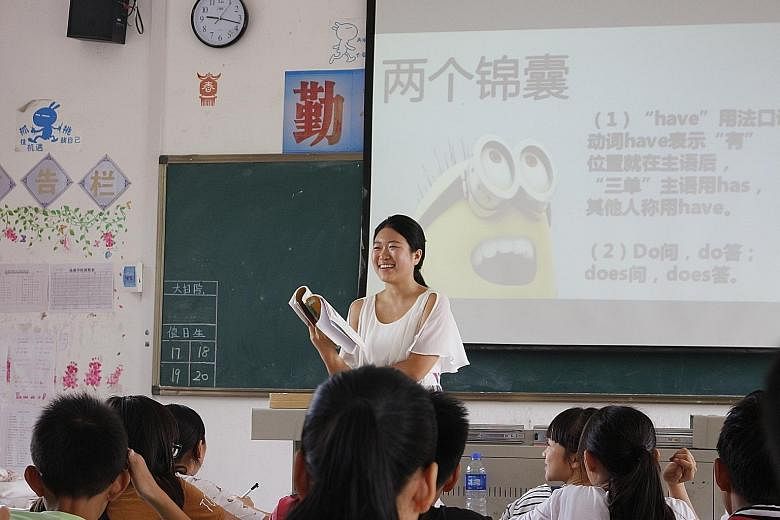Recent graduate Zhang Rongrong has a degree from the prestigious history department of Beijing Normal University. She also had a chance to further her studies in the field. But unsure of a future in teaching history, she chose to volunteer instead.
The 23-year-old now teaches English at a rural secondary school in the mountainous area of southern Guangdong province. Food and lodging are provided by the school, and Teach for China - the non-profit organisation (NPO) that she works with - pays her a monthly stipend of 2,300 yuan (S$476). She will do this for the next two years while she figures out her next steps.
"I've always been interested in education and NPOs. This voluntary experience can help give me more options in my career path," she said. In China, Ms Zhang is described as someone who has chosen the path of "slow employment".
In a recent survey by Chinese Internet giant Tencent of 13,000 students born after 1995 on their career options after graduation, nearly half chose "slow employment" in the form of further studies, entrepreneurship or taking a gap year.
But opinion is divided on whether this new trend is to be encouraged, going by commentaries in the Chinese official media.
A Xinhua news agency commentary said using "slow employment" to describe graduates who have not found work is "self-deceiving".
Coining this new phrase is merely masking the problem of graduates finding it hard to get jobs, especially with the rising number of graduates each year, it said. A record 7.65 million students graduated from universities this year, almost double the number a decade ago.
"Not many families can bear the realities of having their children not working, and no problems can be solved just because a new concept is created," Xinhua added.
However, a commentary in the People's Daily said there is no harm in letting university graduates go out to see the world or take time to find out more about the job market. "Some graduates should be given enough time and space to design their own career paths and life plans," it said.
Another recent graduate, Ms Liu Lu, 24, is doing just that. Instead of looking for a job in her chosen field of film and television in China, she is seeking her fortune in South Korea.
After a six-month internship in a Chinese firm that conceptualises and designs game shows in which "all we do is copy from South Korean programmes", she decided "I might as well go there to learn from them".
She is now studying Korean in Seoul and confesses in a phone interview with The Straits Times that "my Korean proficiency is only enough to chit-chat with the uncles and aunties on the street".
She plans to take another half-year to improve her language skills before applying for a scholarship to do a master's degree. While studying, she will look for a job. "My ultimate aim is to find an internship or a job at a TV station," she said.
Slow employment, said Beijing-based economist Hu Xingdou, is the result of several factors.
First, a slowing economy has made it harder for young graduates to find jobs. Second, given the strong government push for entrepreneurship, many young graduates now want to try their hand at starting a business.
However, Dr Hu maintained that "there's actually no surplus of university graduates in our economy".
"The demand in the small and medium-sized enterprises and the agriculture sector for young graduates is very strong. But most young people would rather be unemployed than take up these jobs, which are perceived as unglamorous," he observed.
"Right now, we are experiencing a cold winter in our economic growth. If the economy continues to slow, the phenomenon of 'slow employment' will worsen."

